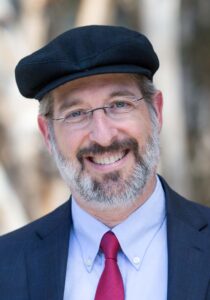Editor’s Note: This is the second part of a review of In Every Generation by Ali Viterbi. Todd Salovey, founding artistic director the Lipinsky Family San Diego Jewish Arts Festival (JFest) explains what is necessary to take an artistic work from a reading to a full stage production. Here is a link to the first part of this story.
By Sandi Masori


SAN DIEGO — After attending an impactful staged reading of Ali Viterbi’s In Every Generation, I asked Todd Salovey, the director of the show, what the next steps might be if the play were to be transformed into a stage production.
“Money,” was his preliminary answer.
He then explained that the path to full production goes like this: They take the script to various theaters to see if there’s any interest. If a theater expresses interest in it, then they offer the theater what’s called an “enhancement fee” towards production costs. This is money that offsets the costs of producing it as a part of the theater’s regular season.
If they don’t get any bites from a theater, then the other route is to raise all of the money to produce the show and then to rent a venue to host it. The challenge there is that without a subscriber base of season ticket holders, patrons, and donors, it can be really tricky to raise enough money and to promote it adequately. In non-profit theater, ticket sales never cover even close to the actual costs of staging a show, so the money has to come from other sources. Without having a theater partner with the existing infrastructure, it’s much harder.
I was a bit confused about the enhancement fee so Salovey explained it in more detail: “So let’s just say there’s a theater in town that says ‘we’re interested, but most of the plays we’re doing right now only have four characters in it’ and I would say “Oh well, this one has five, so we’ll pay for the fifth one, or someone would say ‘we’re only doing smaller sets,’ but we’d like this to be a more extensive set, so we’ll pay for the difference in the set.” The actual amounts may vary from theater to theater, market to market, but the concept is the same.
I wanted to know what it would take to get more Jewish stories to mainstream stages and Salovey responded: “That’s definitely something that JFest is interested in. And that’s the model we’re working with right now. … We find the artists and identify the work and support the work to develop it and get it really really good, and then we stage a workshop” (like the reading I saw) “and that shows us, in front of an audience that this is a really good piece and it could play.”
“And then we raise the money, so that we not only offer the play to a theater, but we offer enhancement to a theater to do it.” Salovey, who was the artistic director and producer at the San Diego Repertory Theater from 1990 to 2022, continued, “If someone came to the Rep and said ‘Look we have $25,000 enhancement, would you look at this play? And if it was a good play, we would take it very seriously. I’ll give you an example, which is when I did the play The Mad Dancers by Yehuda Hyman, it was called A Mystical Comedy with Ecstatic Dance and that play got a $10,000 grant from the Kennedy Foundation. We did that play because we had that grant, so that extra money can encourage a theater to take on a little more risk, a little more size and to get interested in a piece”
I asked him what it would take to get the show all the way to Broadway, but he said that wasn’t really his goal. Instead, he believes more in a grassroots approach and strengthening communities through the arts as opposed to getting it to Broadway. They measure success by if it’s affecting people in the community and getting into other communities.
So with all of that, I wanted to know how can we support this effort? He responded that at the micro level, small budget supporters can go to the Jfest website at www.SdJFest.org and there’s a giant donate button right on top of the home page where supporters can make a donation of any size. For those who want to do even more, with either time of money, you can email Todd directly at tsalovey@ucsd.edu
I asked why it’s so important to support these efforts, and he responded: “It’s more important now than ever. We’re seeing a lot of people feel that Jewish identity is very important because of all the antisemitism happening and that’s one side of it. On the other side is that we again become the victims of antisemitism if we’re only defining ourselves by how we feel threatened. We have to strengthen our own storytelling and really appreciate our unique background and history and what we have to offer. It’s through sharing our stories and making art that offers something incredible and expressing joy through music or art or theater that we promote what makes being Jewish important, vital and beautiful. That’s what JFest is doing”
*
Sandi Masori is a theater and restaurant reviewer for San Diego Jewish World